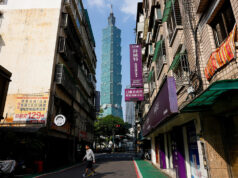BoJ debated whether to boost stimulus

TOKYO — Bank of Japan (BoJ) policy makers debated whether extra easing measures were needed to hit the central bank’s inflation target at its last policy meeting, a summary of opinions showed on Monday, as heightened risks threatened a fragile economic recovery.
Some in the BoJ’s nine-member board insisted on the need to communicate to markets the central bank would maintain loose monetary policy given the time need to accelerate inflation to its 2% price goal, the summary of the Oct. 30-31 meeting showed.
One of the members said additional easing measures would be needed “without hesitation” if momentum toward achieving the inflation target falters.
“In the current situation where risks are skewed to the downside, the Bank should continue to examine whether additional monetary easing will be necessary,” another board member was quoted as saying in the summary.
At the October meeting, the BoJ kept monetary policy steady but introduced new forward guidance to indicate more clearly its readiness to cut rates if needed, underscoring its concern over simmering overseas risks.
In its policy statement last month, the BoJ said it expected short- and long-term interest rates to stay at their present or lower levels given the possibility efforts toward achieving the elusive price target stall.
Board member Goushi Kataoka dissented on the decision to change forward guidance, saying such momentum had already been lost.
In the October meeting summary, some board members warned that long-term uncertainties remained high even as short-term risks temporarily eased on progress in US-China trade negotiations.
One board member said the BoJ needed to signal that its policy stance was now further tilted toward monetary accommodation and a “downward bias in the policy rates.”
However, another member said there had been no increase in risks that the inflation target would be not be met. The board members are not named in the summary.
Under its yield curve control policy, the BoJ pledges to guide short-term rates at -0.1% and the 10-year government bond yield around 0%. It also buys government bonds and risky assets to accelerate inflation to its price goal.
Japanese policy makers have been under pressure to offset the impact on the domestic economy from an overseas slowdown with a diminishing tool-kit, as soft global demand hurts the export-reliant economy.
Given heightened risks to the outlook, Prime Minister Shinzo Abe on Friday asked his cabinet to compile a package of stimulus measures to support the economy and build infrastructure to cope with natural disasters. — Reuters



